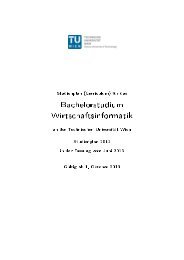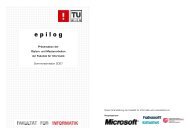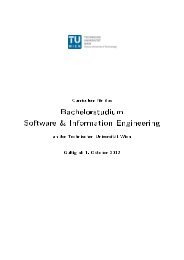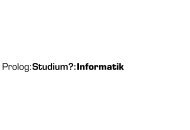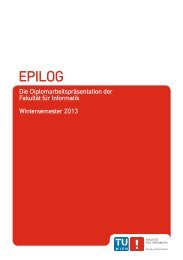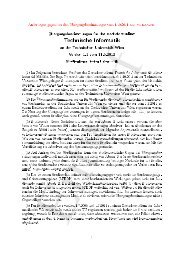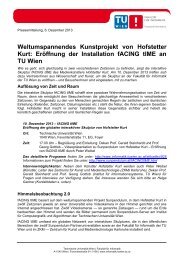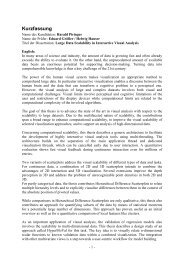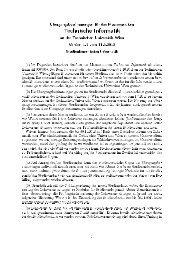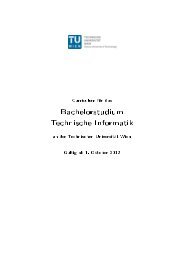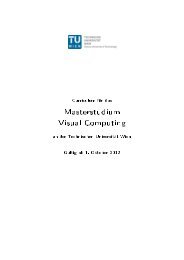Masterstudium Business Informatics - Fakultät für Informatik, TU Wien
Masterstudium Business Informatics - Fakultät für Informatik, TU Wien
Masterstudium Business Informatics - Fakultät für Informatik, TU Wien
Create successful ePaper yourself
Turn your PDF publications into a flip-book with our unique Google optimized e-Paper software.
• Lab: Implementations of concepts, which are important for knowledge-based systems;<br />
implementations of knowledge-based systems; for these implementation task,<br />
languages from AI (e.g., Lisp) and logic-oriented approaches (e.g., answer-set programming)<br />
are used.<br />
Expected Prerequisites: Basic knowledge about propositional and rst-order logic; programming<br />
skills; understanding of algorithms; ability to argue formally and to construct<br />
simple proofs.<br />
Those topics are taught in the bachelor modules WIN/MOD - Modellierung, STW/MAT<br />
- Mathematik und Theoretische <strong>Informatik</strong> , INT/ADA - Algorithmen und Datenstrukturen<br />
and INT/PRO - Programmkonstruktion.<br />
Teaching and Learning Methods and Adequate Assessment of Performance: The module<br />
is organized along lectures, exercises with presentation of the results and discussions,<br />
lab assignments to solve larger problems and implement solutions.<br />
Courses of Module:<br />
6.0/4.0 VU KBS for <strong>Business</strong> <strong>Informatics</strong><br />
FMF/QOM - Quantative Operations Management<br />
ECTS-Credits: 6.0<br />
Summary: This module deals with quantitative methods used in operations management<br />
as well as with decision analysis by mathematical models and econometric methods.<br />
Theoretical background is assessed by periodic exams. To adopt the skills, students<br />
work out examples and case studies, in class as well as at home.<br />
Learning Outcomes:<br />
Knowledge:<br />
Skills:<br />
• Choose and formulate appropriate models for various operative decision problems<br />
• Apply causal and time series forecasting<br />
• Parameter estimation and model validation<br />
• Students learn to use model-based decision support and adopt an outline of the<br />
practical use in the operative division of organisations.<br />
• Students are able to choose among appropriate methods for analytical and forecasting<br />
purposes, to work with dierent data sets and problem formulations, and<br />
to use the computer to apply discussed methods.<br />
• Students adopt familiarity with elementary econometric methods (linear regression<br />
models, time series approaches), specication and testing.<br />
31



